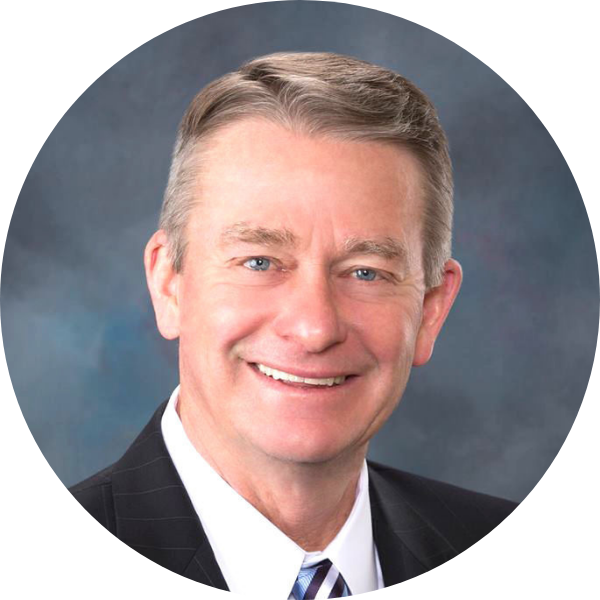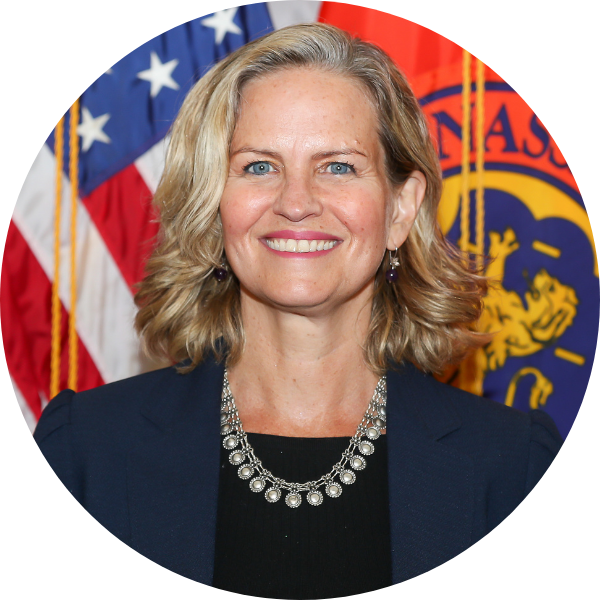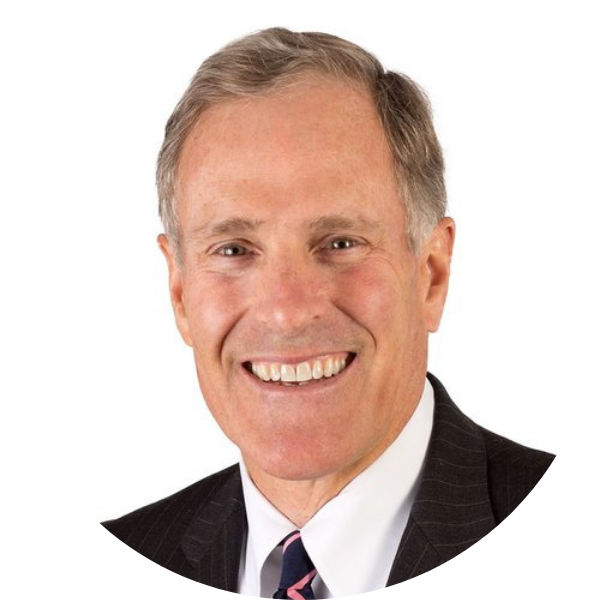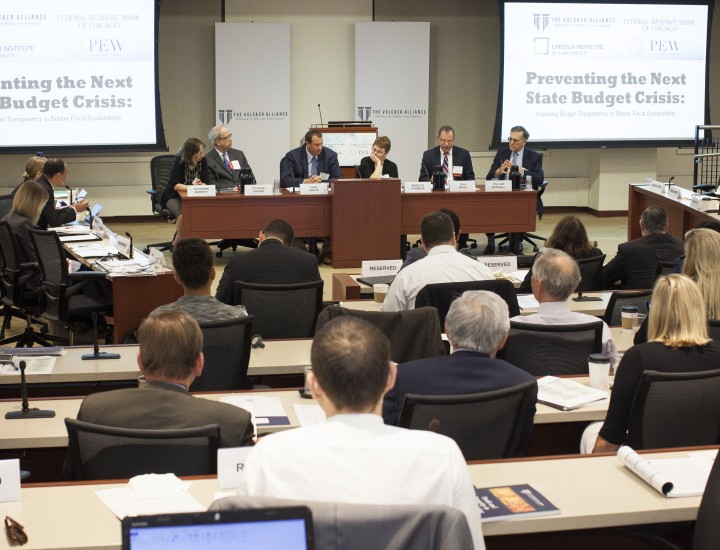Special Briefing on the Biden Infrastructure Plan: Resilience, Equity and Federal Investment

9:00AM
Special Briefing on the Biden Infrastructure Plan:
Resilience, Equity, and Federal Investment
Thursday, July 15, 2021, at 11 a.m. EDT
The Volcker Alliance and Penn Institute for Urban Research cohosted a Special Briefing on President Biden’s proposed infrastructure program, including how state and local governments will use existing American Rescue Plan Act funding to address broadband and water and sewer needs. Our expert panel discussed the Biden plan’s emphasis on resilience and equity; the outlook for investment by counties and cities; and risks posed by climate change to states, counties, and cities in the $4 trillion municipal bond market.
Panelists included Idaho Governor Brad Little; US Representative Carolyn Bourdeaux; Nassau County, New York, Executive Laura Curran; and Municipal Market Analytics President Thomas G. Doe.
Moderated by William Glasgall, Volcker Alliance Senior Vice President and Director of State and Local Initiatives, and Susan Wachter, Co-Director of Penn IUR, this briefing is the twenty-second in a series of sixty-minute online conversations featuring experts from the Volcker Alliance’s national research network and Penn IUR, along with other leading academics, economists, and federal, state, and local leaders.
Special Briefings are made possible by funding from The Century Foundation, the Volcker Alliance, and members of the Penn IUR Advisory Board.
This special briefing featured:
- Idaho Governor Brad Little
- Representative Carolyn Bourdeaux, Democratic Congresswoman from Georgia’s Seventh District
- Laura Curran, Executive, Nassau County (New York)
- Thomas G. Doe, President, Municipal Market Analytics
Special Briefing Episode Summary:
Municipal officials and analysts have their sights set on social equity and climate resilience as Congress debates more than a trillion dollars of infrastructure spending proposed by the Biden administration.
Panelists at a Jury 15 online briefing, co-sponsored by the Penn Institute for Urban Research and The Volcker Alliance, said infrastructure investment should be focused on poorer communities, which have been hit the hardest by the pandemic, natural disasters, and climate change.
"I look at all infrastructure through the climate lens," Municipal Market Analytics (MMA) President Thomas G. Doe said as part of Special Briefing on the Biden Infrastructure Plan: Resilience, Equity, and Federal Investment. "It's looking not just at existing projects and their risk, but also what the future probable risks are for any new efforts that are being done, and, especially, not just on durability but also on equity as well."
The webinar was the 22nd in a series of 60-minute online conversations featuring government leaders and experts from the Volcker Alliance’s and Penn IUR’s national research networks. Volcker Alliance Senior Vice President and Director of Local Initiatives William Glasgall and Penn IUR Co-Director Susan Wachter moderated the discussion. Idaho Governor Brad Little, U.S. Representative Carolyn Bourdeaux, and Nassau County, New York Executive Laura Curran joined Doe on the panel.
The online briefing took place with the U.S. House and Senate in the midst of hashing out legislation to boost the economy through a massive investment in the nation's infrastructure. The proposed investment would come on top of the COVID-19 relief spending enacted last year and early this year: the $2.2 trillion Coronavirus Aid, Relief, and Economic Security (CARES) Act; and the $1.9 trillion American Rescue Plan Act (ARPA).
Rep. Bourdeaux said the House Transportation and Infrastructure Committee passed a bill to invest $547 billion for surface transportation programs, which would reauthorize the Fixing America's Surface Transportation (FAST) Act. The bill represents an 80 percent increase over the previous infrastructure bill for roads, bridges, transit, and rail needs. About the same amount of transportation money was under consideration as part of a $1.2 trillion, five-year package extended over eight years that also includes money for broadband access, water infrastructure, and electric vehicles, she said. The bill includes what Bourdeaux called a "huge increase," to $100 billion, for water and wastewater investment. A version before the Senate has a smaller but still significant increase, with $60 billion for water and wastewater.
"As you know this is not a sexy topic," but it is critical, she said. "It's kind of like your abs when you work out: It is your core."
The nation has done little over the past decade to invest in water infrastructure, she said, resulting in lead leaching into the water in urban areas and leaving suburban areas struggling to keep up with growth. "Swaths of suburbs on septic systems can't grow or develop unless they have water and wastewater infrastructure that underpins them."
Bourdeaux said a "huge struggle" was underway over how to pay for the infrastructure investment, as lawmakers seek to avoid both raising taxes and cutting expenditures. "The pay-fors are wobbly," she said. "I'm not a huge fan of them. I'm willing to make some compromises to get this done. We really need this investment, not only for economic development … but to address the threat of climate change."
Bourdeaux said she was "hopeful" of support for the infrastructure bill from rural, Republican states, where officials have shown an interest in water and broadband, along with other traditional infrastructure. Democrats plan to include additional money for human infrastructure in the budget, she said.
Governor Little said Idaho was being cautious in its use of relief money. "We're not certain, and I don't think anybody is, about when this is going to normalize," he said. "We want to make sure we know what normal is … and what to do when the federal government ceases to inject money into the economy."
He said Idaho would have liked "a little more flexibility" to use CARES and ARPA money on transportation and suggested that restrictions on the uses of those funds may have been part of an effort to drum up political support for the current infrastructure proposals. The state does have a need to maintain its roads and address congestion, he said.
"We're the fastest growing state in the nation, and we want to plan for that," Little said. "As the state grows, infrastructure is a way to address housing affordability, too, if you do it right," he said, suggesting that local governments can build corridors to areas where it's cheaper to build.
He also said Idaho was taking steps on its own to restore the aquifer.
"Regardless of the federal government," he said, "we in Idaho fully intend to do the right thing for future generations."
Curran said Nassau County, which sits on top of its sole source of drinking water, also is focusing efforts on water and wastewater projects. It has "a big ask in" for federal infrastructure support.
"We need to be as resilient as we can along our shoreline," Curran said.
"We are about 90 percent sewered here in Nassau, but on the North Shore there are about 30,000 properties that are not on sewer. They are on septic tanks, and most of the septic tanks are old," Curran said. "They leach a lot of nitrogen into aquifer and into the water. We're using the federal money we have as a grant to people to upgrade their septic tanks."
The county is also using federal funds for police training.
"When you have stable communities, safe communities, and more environmentally resilient communities, that's good for the economy, ergo it’s good for our credit rating," she said, noting the county's efforts to rectify chronic credit issues.
Doe pressed for better long-term planning for climate change. He said the $4 trillion municipal bond market, which finances 75 percent of U.S. infrastructure, issues 30-year debt, but credit rating firms typically look at risk over a two-to-three-year time horizon. MMA is working with risQ, a climate analytics business, to quantify the long-term climate risk for every municipal bond, along with mortgage-backed securities.
"This enables investors, government, planners to look at flood risk, intense heat, hurricane risk, wildfire risk," he said.
Such long-term research will allow officials to consider, on an ongoing basis, where people are going to migrate and where will there be new growth, Doe said. "When we talk about infrastructure we need to talk about what that future might look like."
Special Briefings are made possible by funding from The Century Foundation, the Volcker Alliance, and members of the Penn IUR Advisory Board.
Recordings of the entire Special Briefings series are available on the Volcker Alliance website: SPECIAL BRIEFING SERIES ARCHIVE
 The people of Idaho elected Brad Little as the state’s thirty-third governor in November 2018. He became governor on January 7, 2019.
The people of Idaho elected Brad Little as the state’s thirty-third governor in November 2018. He became governor on January 7, 2019.
Brad is an Emmett native who was raised on his family’s sheep and cattle ranching operation. He graduated from the University of Idaho in 1977 with a Bachelor of Science in Agribusiness and has worked in the ranching industry for his entire professional life. In 1978, Brad had good fortune and married Teresa Soulen of Weiser. They have two sons and six grandchildren.
Brad first served in public office in 2001 when he was selected to fill a Senate vacancy. He was then elected to four consecutive terms to the Idaho Senate. During his service as a senator, Brad was elected by his Republican peers during his first full term to serve in party leadership as Majority Caucus Chair. He then served as Idaho’s 37th Lieutenant Governor, starting on January 6, 2009.
Brad is committed to making decisions through one lens: the lens of ensuring Idaho’s children and grandchildren have the best opportunities to stay in Idaho and for the ones who have left to return. He has advocated his whole life for limited government. He works to ensure the lightest possible hand of government in the lives of Idaho’s citizens, and he seeks to build the public’s confidence in State government.
 Rep. Carolyn Bourdeaux lives with her family in Suwanee, Georgia and represents Georgia's 7th Congressional District. In Congress, Carolyn is a strong advocate for affordable health care, an economic recovery that puts workers and small businesses first, investing in her district's world-class public education system, and developing improved transportation infrastructure to unlock economic opportunity.
Rep. Carolyn Bourdeaux lives with her family in Suwanee, Georgia and represents Georgia's 7th Congressional District. In Congress, Carolyn is a strong advocate for affordable health care, an economic recovery that puts workers and small businesses first, investing in her district's world-class public education system, and developing improved transportation infrastructure to unlock economic opportunity.
Before her election to the U.S. House of Representatives, Carolyn taught as a professor of public management and policy at the Andrew Young School of Policy Studies at Georgia State University, and has served in a number of public service roles during her career.
During the Great Recession, Carolyn was the director of the Georgia Senate Budget and Evaluation Office, where she worked with both parties to balance Georgia’s budget and get the state economy back on track. In this role, Carolyn advocated for a number of policies to improve transparency and fiscal responsibility in the budget process, and was instrumental in developing legislation to track and account for all tax breaks, including corporate tax loopholes. At the end of her time with the Senate Budget Office, Carolyn was honored with a bipartisan special resolution for significant service to the state of Georgia.
In her early career, Carolyn served as a legislative aide to U.S. Senator Ron Wyden (D-OR), where she worked with him on a wide range of policy issues, including improving transit and transportation infrastructure and expanding access to health care and food programs for low income families.
Georgia's 7th District includes portions of the northeast Atlanta metropolitan area, including portions of Forsyth and Gwinnett counties and cities Peachtree Corners, Berkeley Lake, Sugar Hill, Norcross, Cumming, Lawrenceville, Duluth, Snellville, Lilburn, Suwanee, Grayson, and Buford.
 Laura Curran has served as Nassau County Executive since 2018, when she became the first woman to hold the office. Representing more than 1.3 million residents, County Executive Curran prioritized restoring trust and fiscal integrity to a Nassau County government long plagued by corruption and deficits. County Executive Curran implemented unprecedented ethics reforms, bringing transparency and controls to County contracts. The County Executive also successfully advocated for new economic development and downtown revitalization projects across the County, helping increase the number of good-paying jobs for residents, providing additional housing options for residents across income levels, and locating both near public transit. After the pandemic hit Nassau County, she led the County’s response to protect and inform residents, while maintaining essential County operations and advocating for small businesses and schools.
Laura Curran has served as Nassau County Executive since 2018, when she became the first woman to hold the office. Representing more than 1.3 million residents, County Executive Curran prioritized restoring trust and fiscal integrity to a Nassau County government long plagued by corruption and deficits. County Executive Curran implemented unprecedented ethics reforms, bringing transparency and controls to County contracts. The County Executive also successfully advocated for new economic development and downtown revitalization projects across the County, helping increase the number of good-paying jobs for residents, providing additional housing options for residents across income levels, and locating both near public transit. After the pandemic hit Nassau County, she led the County’s response to protect and inform residents, while maintaining essential County operations and advocating for small businesses and schools.
Under Curran’s watch, major crime in Nassau County hit historic lows, thanks to continued commitment to community policing, which the County Executive built on by reopening two police precincts and breaking ground on a new police academy on the Nassau Community College campus. Nassau County was named by U.S. News & World Report as the safest community in America for 2020. Following through on a campaign promise, Curran also fixed a broken property assessment system that amassed enormous debt while unfairly burdening half of taxpayers. She mobilized the County’s resources to battle the pandemic, establishing an elaborate contact tracing program. County Executive Curran also secured much needed funding and personal protective equipment for many businesses, advocating to reopen safely, while protecting lives and livelihoods.
The County Executive made a commitment to making Nassau County a better place to live, work and play for all residents, even while navigating Nassau through the pandemic. Under County Executive Curran’s leadership, the County repaved a record amount of roadway, increased accessibility and language access of government services, and dedicated significant funds to revitalizing parks throughout the County—with a commitment to making parks and playgrounds accessible to all. As the pandemic led to unprecedented challenges and change, County Executive Curran has led with dedication to the people of Nassau County and remains a tireless advocate for Nassau’s residents and businesses, providing decisive leadership while protecting residents’ health and safely.
 Thomas G. Doe is President of Municipal Market Analytics, Inc. (MMA) which acquired Municipal Market Advisors in 2014. Mr. Doe founded and served as the CEO of Municipal Market Advisors, the leading independent research firm in the municipal industry, from its inception in 1995.
Thomas G. Doe is President of Municipal Market Analytics, Inc. (MMA) which acquired Municipal Market Advisors in 2014. Mr. Doe founded and served as the CEO of Municipal Market Advisors, the leading independent research firm in the municipal industry, from its inception in 1995.
Mr. Doe’s contribution to the municipal industry has been extensive as an analyst, strategist and visionary of the industry’s future. His perspective has been sought after by the leading organizations and institutions and his independence, and that of his firm, has resulted in appearances before Congress and financial regulators to help inform them of the dynamics, issues and challenges in the municipal market and financing public infrastructure. Most memorably, on January 20, 2011, Mr. Doe forcefully represented the industry in a CNBC interview to accurately define market credit risks in response to Meredith Whitney’s alarmist municipal default projection.
Mr. Doe is also lead analyst on MMA’s monthly Municipal Advisor publication which began in 1995, and the firm’s Strategist report. He also contributes to the Insight product.
Between 2002 and 2005, Mr. Doe served a 3-year term as a public member on the Municipal Securities Rulemaking Board (MSRB), the regulatory entity of the municipal securities industry.
Prior to founding MMA, Mr. Doe served as an analyst and manager at Municipal Market Data, Inc. from 1984 to its successful sale to the Thomson Reuters Corporation in 1994.
Mr. Doe received his undergraduate degree from Colgate University and a Master’s from Harvard University.


